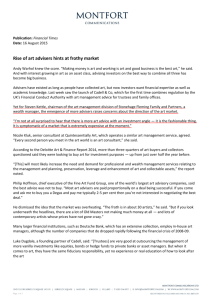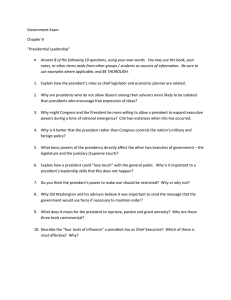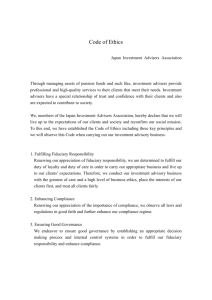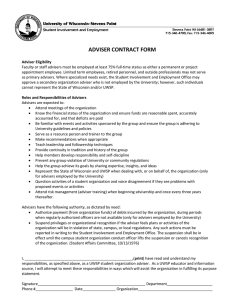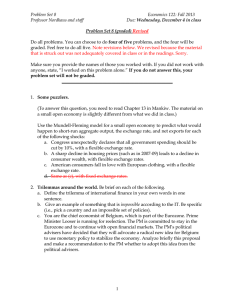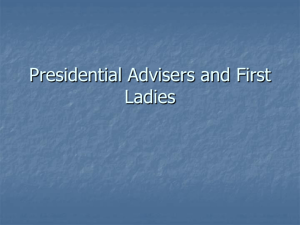Submission to the Public Administration Committee Inquiry on Special Advisers
advertisement
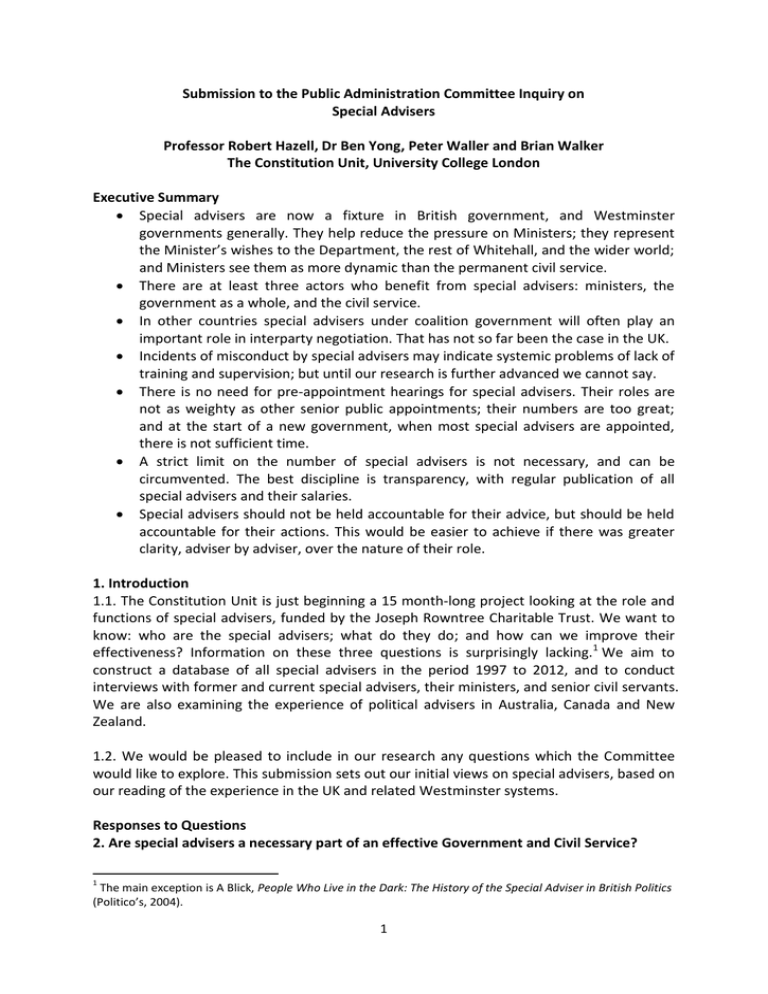
Submission to the Public Administration Committee Inquiry on Special Advisers Professor Robert Hazell, Dr Ben Yong, Peter Waller and Brian Walker The Constitution Unit, University College London Executive Summary Special advisers are now a fixture in British government, and Westminster governments generally. They help reduce the pressure on Ministers; they represent the Minister’s wishes to the Department, the rest of Whitehall, and the wider world; and Ministers see them as more dynamic than the permanent civil service. There are at least three actors who benefit from special advisers: ministers, the government as a whole, and the civil service. In other countries special advisers under coalition government will often play an important role in interparty negotiation. That has not so far been the case in the UK. Incidents of misconduct by special advisers may indicate systemic problems of lack of training and supervision; but until our research is further advanced we cannot say. There is no need for pre-appointment hearings for special advisers. Their roles are not as weighty as other senior public appointments; their numbers are too great; and at the start of a new government, when most special advisers are appointed, there is not sufficient time. A strict limit on the number of special advisers is not necessary, and can be circumvented. The best discipline is transparency, with regular publication of all special advisers and their salaries. Special advisers should not be held accountable for their advice, but should be held accountable for their actions. This would be easier to achieve if there was greater clarity, adviser by adviser, over the nature of their role. 1. Introduction 1.1. The Constitution Unit is just beginning a 15 month-long project looking at the role and functions of special advisers, funded by the Joseph Rowntree Charitable Trust. We want to know: who are the special advisers; what do they do; and how can we improve their effectiveness? Information on these three questions is surprisingly lacking.1 We aim to construct a database of all special advisers in the period 1997 to 2012, and to conduct interviews with former and current special advisers, their ministers, and senior civil servants. We are also examining the experience of political advisers in Australia, Canada and New Zealand. 1.2. We would be pleased to include in our research any questions which the Committee would like to explore. This submission sets out our initial views on special advisers, based on our reading of the experience in the UK and related Westminster systems. Responses to Questions 2. Are special advisers a necessary part of an effective Government and Civil Service? 1 The main exception is A Blick, People Who Live in the Dark: The History of the Special Adviser in British Politics (Politico’s, 2004). 1 2.1. Special advisers have become a fixture of British government; and indeed in those Westminster countries we have examined (Australia, Canada, Ireland, New Zealand), ‘political staff’ are accepted as a necessary part of government. One sign of this is that numbers of political staff in these countries have increased significantly since the 1970s: in Australia and Canada ministers have far bigger political staffs than in the UK (see Tables 1 and 2). 2.2. The drivers behind the growing recruitment of political staff are many, but we identify two. The first is ministerial overload. Ministerial workloads have steadily increased, with the growth in government, its complexity, the growth of EU and international business, and relentless pressures of 24/7 media. Special advisers increase ministers’ capacity to cope. 2.3. The second driver is the desire for greater responsiveness from the ‘government machine’; and it is this aspect we focus on here. Special advisers provide that greater responsiveness that ministers see as lacking in the civil service. They are less encumbered by conventional thinking and institutional practice; they have political skills, and provide a link with the party; they bring into government wider perspectives, and links to the outside world. And because their fortunes are linked directly to their minister’s, they owe their minister total loyalty. 2.4. But the very attributes of special advisers which governments want are also the reasons why special advisers are treated with suspicion. Being ‘responsive’ may also mean prioritising the minister’s interests against those of his colleagues; favouring short-term political advantage over long term policy gains; selective briefing of the media; negative briefing against rivals and opponents; favouring some interest groups over others; and cocooning the minister from unwelcome advice or different points of view. 2.5. So against this desire for democratic responsiveness must be set other values which are also vital to the business of government: the civil service values of integrity, impartiality, objectivity and expertise. But the civil service can become inward looking and conservative. The trick is to find the appropriate balance: allowing the government to get the changes and dynamism it needs, without compromising these other values. 3. For whose benefit do special advisers exist? 3.1. There are at least three actors benefitting from special advisers. Primarily, they are there to benefit ministers: to provide a party perspective, to provide a channel for outside expertise, to deal with interest groups and the media, and generally to relieve the workload of the minister. 3.2. Following the formation of the Coalition, the Code of Conduct for special advisers was modified to make clear that special advisers have a duty not just to their individual minister, but also to the Government as a whole. This is a dilemma which also faces civil servants. But for special advisers the incentives remain structured in favour of immediate loyalty to the minister, rather than the government. 3.3. Special advisers may also be useful to civil servants. They may be more accessible to civil servants than a busy minister, and be able to indicate his views or wishes. This may 2 often be without consulting the minister (‘I know he would want you to do x’). Civil servants can get a steer from the special adviser at an early stage of policy development, before putting a formal submission to the minister. Civil servants can also ask special advisers to be fixers, to unplug political blockages in other Departments, or at the centre of Whitehall. And they can look to special advisers to perform political tasks: to communicate with the party, to brief the media in an overtly political way, to draft political speeches. 3.4. Finally, there may be long term advantages for future governments if a number of their incoming ministers have had practical experience of working in Whitehall departments at an earlier stage in their career. 4. Does (or should) the role of special advisers change under a coalition Government? 4.1. In other Westminster countries, special advisers have had a key role in coalition management. New Zealand is a prime example, where successive multiparty governments since 1996 have been a key driver in the rise in numbers of special advisers. Multiparty governments require greater time for interparty negotiation. Such negotiations are highly political: special advisers play an important role, relieving the burden on their ministers.2 4.2. In our research on the current UK coalition government, we found that special advisers have not yet systematically taken on a role of this kind.3 That is partly because until 2012 most departments had special advisers from one party only; and partly because special advisers did not have sufficient seniority or experience to command the trust of their ministers, so ministers have chosen to negotiate coalition issues themselves. The additional recruitment announced in October 2011 of six special advisers to support Liberal Democrat junior ministers should make it easier to ‘coalitionise’ issues within Departments, because Conservative special advisers will now have Lib Dem counterparts. 4.3. Whether or not special advisers ought to have an ‘additional’ role in coalition governments (eg., in negotiation over coalition issues) is a decision for the ministers involved. Special advisers are a resource to be used. It may be that with growing experience and confidence, ministers are willing to delegate more inter-party negotiation to their advisers. 5. How valid are concerns about the conduct and propriety of special advisers? 5.1. Concerns about special advisers and their actions have been raised in all the Westminster countries we have examined. These concerns are similar to those raised in the UK: They exercise improper and/or disproportionate influence They marginalise the civil service They lack transparency and accountability. 2 C Eichbaum and R Shaw "Ministerial Advisers, Politicisation, and the Retreat from Westminster: The Case of New Zealand" (2007) 85(3) Public Administration 609-640. 3 R Hazell and B Yong, The Politics of Coalition – How the Conservative-Liberal Democrat Government Works. (Hart Publishing, June 2012). 3 5.2. It is difficult to evaluate the validity of these claims. There have been high profile incidents involving special advisers in the UK (for instance, Jo Moore, Damien McBride, Adam Smith) but it is not clear whether these are isolated incidents or examples of systemic problems. Since 1997 there have been some 70-80 special advisers at any one time, the majority of whom do not come to public notice. To put these figures in perspective, there are some 125 government ministers (including Whips), and since 1990 20 ministers have resigned because of financial or other scandals.4 5.3. In the Westminster jurisdictions we have examined, there have also been incidents involving special advisers and calls for closer scrutiny of their behaviour: in Australia the 2001 ‘children overboard’ case;5 in Canada, the 2004 sponsorship scandal.6 This has not led to tighter controls than those in the UK. 5.4. We should note again the double-sided nature of special advisers: that those characteristics which help ensure the government is more responsive are the same characteristics which mean special advisers are treated with suspicion. If we accept that special advisers are there to provide impetus and dynamism, to liaise with interest groups and the media, and generally to be the minister’s alter ego, then ministers will wish to employ those with skills which mirror their own. Ministers in a hurry are prone to get into trouble for cutting corners, and excessively zealous special advisers risk doing the same. 5.5. One separate question the Committee may wish to address is the issue of ‘informal’ special advisers. Under Blair and Brown additional advisers were appointed who were not special advisers: expert policy advisers, ‘czars’ and the like. Some of these policy advisers were appointed as temporary, and some as permanent civil servants; and sometimes special advisers have moved on to become civil servants. There have been suggestions that these appointments have been made to get round any limits on the number of special advisers; or that these practices may ultimately ‘politicise’ the civil service. 6. Should special advisers be subject to pre-appointment hearings? 6.1. We favour greater use of pre-appointment hearings for significant public appointments; but can see no case for such appointments being extended to special advisers, for reasons of principle and practicality. 6.2. In terms of principle, pre-appointment hearings are justified where the office holder holds genuine executive power. Special advisers hold no such power; and their role is advisory only – and Ministers seek numerous other sources of advice. There is a stronger case for pre-appointment scrutiny for Government Ministers; but at the beginning of a new government that would simply not be practicable, because it takes months for Parliament to elect new Select Committees. 4 G Subrahmanyam, ‘The first minister is forced out of the Cameron-Clegg team – does it fit recent trends in ministerial resignations?’ LSE Blog 3 June 2010. 5 Senate Select Committee on a Certain Maritime Incident report, available here: http://trove.nla.gov.au/work/16931377. 6 See the Gomery Commission Report, here: http://epe.lac-bac.gc.ca/100/206/301/pcobcp/commissions/sponsorship-ef/06-02-10/www.gomery.ca/en/phase1report/default.htm. 4 6.3. A further difficulty in relation to special advisers is that Ministers use them in very different ways - whether focussing on policy development, communications, relationships with the party and so on – and there would be no easy job description against which any Select Committee could make judgements. Finally, Ministers spend a lot of time with their advisers, and personal chemistry is important. That is something which cannot be second guessed by a Committee. 6.4. In the Westminster countries we have examined, no country requires political advisers to be subject to pre-appointment hearings (see Table 3). In the US, political appointees to departments are subject to Congressional agreement; but that has its own disadvantages, not least serious delays (at the end of his first year, one half of Obama’s appointees were still awaiting Congressional approval). 7. Is a strict limit on the number of special advisers helpful? 7.1. Some limits on special advisers may be desirable - but it is a matter for each Prime Minister to decide how many special advisers his administration needs. What would not be helpful is a strict limit which constrains effectiveness and starts from the premise that special advisers are a necessary evil whose numbers must be driven down. 7.2. We believe it is a false economy to force down the number of special advisers to a point where Ministers find themselves short of political support and advice; and to a point where they and their special advisers are so overworked that the system can barely cope. Subject to our forthcoming research, we incline to the view that there are too few, not too many special advisers. In our recent research on the effectiveness of the Coalition in Whitehall, a large number of interviewees (including civil servants) said that the Coalition had cut back too much on special advisers, causing delays and ineffectiveness. 7.3. In other Westminster countries, the number of special advisers is significantly higher. In Australia there are over 400 ‘ministerial advisers’ for 40 ministers; in Canada, there were over 600 ‘exempt’ staff for 30-odd minister. The ratio is 10 political staff for every minister in Australia; and 20 in Canada (see Tables 1 and 2). The ratio in Westminster is two special advisers for each Cabinet minister (and one for those ministers attending Cabinet). There are no limits on the number of special advisers in these countries, save what the Prime Minister specifies and/ or political realities. In practice, the political staff in Australia and Canada now dominate the minister’s private office; and add significantly to the capacity of the Prime Minister’s Office. 8. How should special advisers be held accountable for their advice and actions? Are any specific changes needed to the Ministerial Code, or the Code of Conduct and Model Contract for special advisers to improve accountability? 8.1. A distinction should first be drawn between accountability for advice and actions. In broad terms, special advisers should not be accountable at all for their advice: it is only one source of advice available to Ministers, and part of their function must be to challenge conventional wisdom. But it is undeniable that special advisers should be held to account for their actions – and particularly where they appear to have gone beyond their brief as understood and laid down by their Minister. 5 8.2. Currently, the Ministerial Code states that ministers are ultimately responsible for the actions and behaviour of their special adviser(s).7 Where there are allegations about a special adviser’s conduct, in the first instance the relevant Permanent Secretary will investigate and make recommendations to the Minister, but the ultimate responsibility for initiating an investigation and disciplining a special adviser rests with the appointing Minister.8 8.3. The involvement of the Permanent Secretary stems in part from the fact that special advisers are classed as temporary civil servants. But the awkward position of the Permanent Secretary is illustrated by the reluctance of the DCMS Permanent Secretary Jonathan Stephens to offer a view on the conduct of Jeremy Hunt’s special adviser Adam Smith. 8.4. This is something we hope to explore further in our research. The range of possible solutions might include: Reclassifying special advisers so that they are no longer temporary civil servants Requiring the Permanent Secretary to seek a formal direction from the Minister whenever he has concerns about the activities of special advisers (similar to his Accounting Officer powers in relation to questionable expenditure) Leaving discipline of special advisers solely in the hands of the appointing Minister; or moving it to the Prime Minister’s chief special adviser (making him responsible for the conduct of all special advisers); or to the Cabinet Secretary. 8.5. It would also help upon appointment to have greater clarity over the scope of the special adviser’s authority and duties. Secretaries of State set out the roles and responsibilities of the junior Ministers within their Department. It might be possible for the roles of special advisers to be set out in the same announcement. Special advisers and their effectiveness 9.1. A key question in our research project is: how can we make special advisers more effective? If we accept that special advisers are necessary, then we need to think how to improve their performance. This raises questions about their recruitment; training; support and supervision. 9.2. We have only just begun to explore this, and we do not pretend there are easy answers. But the possibilities to be explored might include: More selective recruitment (eg in Wales Rhodri Morgan ran an open competition for advisers to his first administration) Encourage the political parties to undertake training for potential special advisers (eg., the ‘political advisers’ for shadow ministers). A more specific, detailed job description identifying the skills they need 7 Cabinet Office, Ministerial Code (May 2010), para. 3.2; Cabinet Office, Code of Conduct for Special Advisers (June 2010), para. 4. 8 This was made clear in the Government’s response to the Wicks Committee’s report Defining The Boundaries within the Executive: Ministers, Special Advisers and the Permanent Civil Service in 2003: see O. Gay, Special Advisers, House of Commons Library Std. note, SN/PC/03813 (4 November 2010), pp. 8-9. 6 Proper induction training. Currently special advisers are given minimal or no induction. In 2010 the Institute for Government filled the gap by offering some initial training courses. Whitehall might devise its own induction training, led by the Cabinet Office, and drawing on former ministers, special advisers and civil servants. (This raises a wider question, about the lack of induction training for ministers). Better support for special advisers, possibly by giving them a departmental Private Secretary to help them liaise with the Department. Better supervision and annual appraisal. But it is not easy to identify who should do this: the appointing Minister? The PM’s chief special adviser? It relates to who should be responsible for the discipline of special advisers, raised in para 8.4. 7 Political Staff in Four Westminster Jurisdictions Table 1: Political Staff Numbers9 United Kingdom Australia Canada 82 75 70 403 74 320 73 318 600 68 428 513 Year 2012 2011 2010 2009 2008 2007 New Zealand 58 53 Table 2: Minister/ Political Staff Ratios10 Country Numbers of Cabinet Ministers (2007) 22 (Brown Government) 38 (Rudd Government) 27 (Harper Government) 20 (Clark Government) United Kingdom Australia Canada New Zealand Country United Kingdom Australia Canada NZ Average number of spads per minister (2007) 3.1 11.3 19 2.6 Table 3: The Accountability of Political Staff Statutory PrePolitical Staff Code Accountable Limit? appointment of Conduct? to Minister? hearing? N N Y (since 2001) Y N N N N N N Y (since 2008) N N 9 Y Y Y Accountable to Parliament? N N N N For Australia, Canada, New Zealand, see C. Eichbaum and R. Shaw, Partisan Appointees and Public Servants: An International Analysis of the Role of the Political Adviser (Cheltenham, 2010), pp. 73, 94-113, 117. For Australia see also N. Horne, ‘The Members of Parliament (Staff) Act 1984 framework and employment issues’, Parliament of Australia Research Paper, 26 (3 April 2009), p. 15. For Canada see also A. Smith, ‘Ministerial Staff: Issues of Accountability and Ethics’, Library of Parliament (1 December 2008), p. 3. For the UK see O. Gay, ‘Special Advisers’, House of Commons Standard Note, SN/PC/03813 (15 December 2011). 10 United Kingdom: BBC News, Brown unveils huge Cabinet revamp, reproduced at http://news.bbc.co.uk/1/hi/6247502.stm; accessed 22 May 2012. Australia: news.com.au, Kevin Rudd’s Cabinet in full, reproduced at http://www.news.com.au/features/federal-election/kevin-rudds-cabinet-infull/story-e6frflo0-1111114994307; accessed 22 May 2012. Canada: CBC news, Stephen Harper’s first reshuffle, reproduced at http://www.cbc.ca/news/background/parliament39/cabinet.html; accessed 22 May 2012. New Zealand: Ministry of Justice, Ministerial List as at 31 October 2007, reproduced at http://www.justice.govt.nz/publications/global-publications/d/directory-of-official-informationarchive/directory-of-official-information-december-2007/ministerial-list; accessed 22 May 2012. 8
